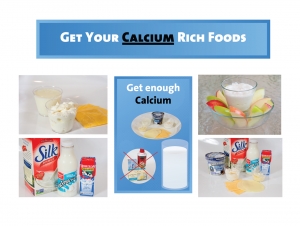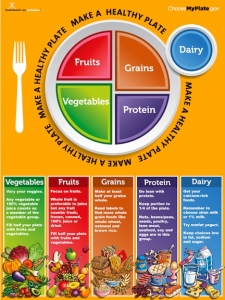Calcium and the Dietary Guidelines for Americans
 Oh, what woeful news! The Dietary Guidelines for Americans assert, “A wide variety of nutritious foods are available in the United States. However, many Americans do not eat the array of foods that will provide all needed nutrients while staying within calorie needs. As a result, dietary intakes of several nutrients — potassium, dietary fiber, calcium, and vitamin D — are low enough to be of public health concern for both adults and children.”Here’s the thing. Most Americans simply aren’t getting enough of certain vital nutrients. These nutrients include…
Oh, what woeful news! The Dietary Guidelines for Americans assert, “A wide variety of nutritious foods are available in the United States. However, many Americans do not eat the array of foods that will provide all needed nutrients while staying within calorie needs. As a result, dietary intakes of several nutrients — potassium, dietary fiber, calcium, and vitamin D — are low enough to be of public health concern for both adults and children.”Here’s the thing. Most Americans simply aren’t getting enough of certain vital nutrients. These nutrients include…
- Calcium
- Dietary Fiber
- Potassium
- Vitamin D
This is seriously bad news for good health. So I want to take a minute and discuss each of these nutrients of concern in more depth.First, let’s zoom in on calcium.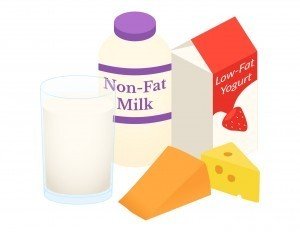 Calcium is a mineral that is vital to good health. You can find it in most dairy products, especially milk and yogurt. Dairy foods like butter and sour cream don’t have enough calcium to be considered good sources of this nutrient, while other foods (like cereal) don’t have any calcium at first, but are then fortified with this important mineral. Certain nuts and vegetables have calcium too, but, according to the Dietary Guidelines for Americans, “Calcium in some plant foods is well absorbed, but consuming enough plant foods to achieve the RDA may be unrealistic for many.”This brings us back to milk products, which the guidelines claim “contribute substantially to calcium intake by Americans.” Since these products can also be high in saturated fat, it’s wise to choose low-fat or nonfat versions. That way, you get the most nutrients with the fewest empty calories. It’s a win-win!If you’re going milk-free, the guidelines assert “Removing milk and milk products from the diet requires careful replacement with other food sources of calcium, including fortified foods,” so talk with your dietitian or doctor to make sure that you’re getting enough!So. Why is calcium so important to good health?The answer lies in your bones. The Dietary Guidelines for Americans insist, “Adequate calcium status is important for optimal bone health.” The National Institutes of Health add some detail, asserting, “Your body […] needs calcium […] to make healthy bones. Bones are the main storage site of calcium in the body.” And of course your bones are key to a healthful life. They support you, protecting your organs and bodily systems from harm. Because it’s hard to feel your bones become fragile, many people don’t realize they’re in danger until after they break a bone. At this point, the weakness is so advanced that it’s hard to repair.
Calcium is a mineral that is vital to good health. You can find it in most dairy products, especially milk and yogurt. Dairy foods like butter and sour cream don’t have enough calcium to be considered good sources of this nutrient, while other foods (like cereal) don’t have any calcium at first, but are then fortified with this important mineral. Certain nuts and vegetables have calcium too, but, according to the Dietary Guidelines for Americans, “Calcium in some plant foods is well absorbed, but consuming enough plant foods to achieve the RDA may be unrealistic for many.”This brings us back to milk products, which the guidelines claim “contribute substantially to calcium intake by Americans.” Since these products can also be high in saturated fat, it’s wise to choose low-fat or nonfat versions. That way, you get the most nutrients with the fewest empty calories. It’s a win-win!If you’re going milk-free, the guidelines assert “Removing milk and milk products from the diet requires careful replacement with other food sources of calcium, including fortified foods,” so talk with your dietitian or doctor to make sure that you’re getting enough!So. Why is calcium so important to good health?The answer lies in your bones. The Dietary Guidelines for Americans insist, “Adequate calcium status is important for optimal bone health.” The National Institutes of Health add some detail, asserting, “Your body […] needs calcium […] to make healthy bones. Bones are the main storage site of calcium in the body.” And of course your bones are key to a healthful life. They support you, protecting your organs and bodily systems from harm. Because it’s hard to feel your bones become fragile, many people don’t realize they’re in danger until after they break a bone. At this point, the weakness is so advanced that it’s hard to repair.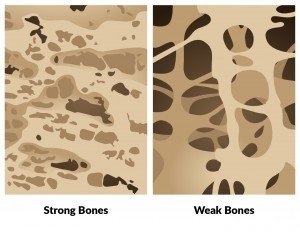 According to the National Institutes of Health’s Osteoporosis and Related Bone Diseases Resource Center “The amount of calcium that makes up your bones is the measure of how strong they are. But your muscles and nerves must also have calcium and phosphorus to work. If these are in short supply from foods you eat, your body simply takes them from your bones.”So there’s a double whammy. Not only will your body take calcium out of your bones in order to do what it needs to do, but it also needs calcium to complete a variety of other key processes. The Dietary Guidelines for Americans maintain, “In addition, calcium serves vital roles in nerve transmission, constriction and dilation of blood vessels, and muscle contraction.”Really, what doesn’t calcium do?Actually, let’s ask a different question. What happens in your body if you aren’t getting enough calcium in your diet?It’s bad news.According to the Dietary Guidelines for Americans, “A significant number of Americans have low bone mass, a risk factor for osteoporosis, which places them at risk of bone fractures.” You see, as you neglect to consume enough calcium in your diet, your body pulls the rest of what it needs from your bones. This weakens them, lowering your bone mass and raising your risk of osteoporosis and bone fractures. If a bone gets weak enough, it will break much more easily than a strong bone will. (I know it sounds obvious, but that’s why you don’t want to let your bones get weakened). According to the Surgeon General’s Report on Bone Health and Osteoporosis, “People who have weak bones are at higher risk for fractures.” Another study, The Role of Dietary Calcium in Bone Health, asserts “inadequate dietary [calcium] accelerates bone loss and may contribute to osteoporosis.”
According to the National Institutes of Health’s Osteoporosis and Related Bone Diseases Resource Center “The amount of calcium that makes up your bones is the measure of how strong they are. But your muscles and nerves must also have calcium and phosphorus to work. If these are in short supply from foods you eat, your body simply takes them from your bones.”So there’s a double whammy. Not only will your body take calcium out of your bones in order to do what it needs to do, but it also needs calcium to complete a variety of other key processes. The Dietary Guidelines for Americans maintain, “In addition, calcium serves vital roles in nerve transmission, constriction and dilation of blood vessels, and muscle contraction.”Really, what doesn’t calcium do?Actually, let’s ask a different question. What happens in your body if you aren’t getting enough calcium in your diet?It’s bad news.According to the Dietary Guidelines for Americans, “A significant number of Americans have low bone mass, a risk factor for osteoporosis, which places them at risk of bone fractures.” You see, as you neglect to consume enough calcium in your diet, your body pulls the rest of what it needs from your bones. This weakens them, lowering your bone mass and raising your risk of osteoporosis and bone fractures. If a bone gets weak enough, it will break much more easily than a strong bone will. (I know it sounds obvious, but that’s why you don’t want to let your bones get weakened). According to the Surgeon General’s Report on Bone Health and Osteoporosis, “People who have weak bones are at higher risk for fractures.” Another study, The Role of Dietary Calcium in Bone Health, asserts “inadequate dietary [calcium] accelerates bone loss and may contribute to osteoporosis.” In other words, your health will suffer if you don’t get enough calcium on a regular basis.Now, some people need to be especially aware of how much calcium they’re getting. For example, the Dietary Guidelines for Americans claim, “Age groups of particular concern due to low calcium intake from food include children ages 9 years and older, adolescent girls, adult women, as well as adults ages 51 years and older.”Oh, and before you grab a calcium supplement, take a moment to consider this warning from the Dietary Guidelines for Americans, “Sufficient evidence is not available to support a recommendation for or against the use of multivitamin/ mineral supplements in the primary prevention of chronic disease for the healthy American population.”If you can, stick to calcium-rich foods.And there you have it — a closer look at one of the nutrients of concern. This series will continue in the coming weeks, so keep your eyes peeled for similar posts on dietary fiber, potassium, and vitamin D.In the meantime, here’s a brand-new calcium handout, just for you! Download a free copy today!
In other words, your health will suffer if you don’t get enough calcium on a regular basis.Now, some people need to be especially aware of how much calcium they’re getting. For example, the Dietary Guidelines for Americans claim, “Age groups of particular concern due to low calcium intake from food include children ages 9 years and older, adolescent girls, adult women, as well as adults ages 51 years and older.”Oh, and before you grab a calcium supplement, take a moment to consider this warning from the Dietary Guidelines for Americans, “Sufficient evidence is not available to support a recommendation for or against the use of multivitamin/ mineral supplements in the primary prevention of chronic disease for the healthy American population.”If you can, stick to calcium-rich foods.And there you have it — a closer look at one of the nutrients of concern. This series will continue in the coming weeks, so keep your eyes peeled for similar posts on dietary fiber, potassium, and vitamin D.In the meantime, here’s a brand-new calcium handout, just for you! Download a free copy today!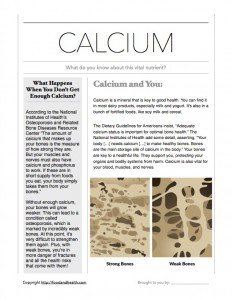 Remember, we’re here to help you look your very best, right now, so don’t miss these great resources from the Nutrition Education Store!
Remember, we’re here to help you look your very best, right now, so don’t miss these great resources from the Nutrition Education Store!